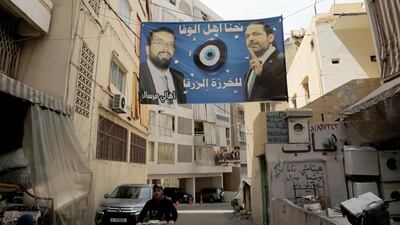As its first parliamentary vote in nearly a decade approaches, Lebanon has been swept into campaign fever: posters on every corner, televised debates and neighbours bickering over new electoral procedures.
Stakes are high in the long-awaited May 6 poll, the first test of Lebanon's 2017 voting law, that will carve out the country's political and economic trajectory for years to come.
Voters and candidates alike are eager for polling to start, nearly a decade after the last parliamentary elections in June 2009.
The 128 lawmakers elected then have extended their mandate three times, citing potential spillover from the war in neighbouring Syria and an unsatisfactory voting law.
But after years of deadlock, Lebanon's politicians agreed to elect a president, form a government and move towards a complex new ballot system, paving the way for next month's historic vote.
"It's a new electoral experience for Lebanon," said Imad Salame, a professor of political science at Beirut's Lebanese American University.
The next parliament will select Lebanon's future prime minister and legislate on major social and economic issues, while attempting to keep sectarian tensions in check.
"The stakes in this election are quite high due to the delicate balance of power between the different sectarian groups in the country," Mr Salame said.
The country of about four million is governed by a power-sharing agreement that leaves little to chance, with parliament equally divided between Muslims and Christians then further split among different sects.
Read more: In Lebanon's election, one man's place in parliament is certain
But the new electoral system, the frustration of young voters and the candidacy of scores of independents have sparked hope for something different.
"This country needs a change. I've been complaining about it for years, so not doing anything is not a solution," said Ingrid Hag, 25.
The communications consultant, who will be casting her ballot for the first time, said she had yet to decide how she will vote, but wants a government that cares about environmental issues, women's rights and reliable public services.
Across the country, 917 candidates are running on 77 lists, launching their campaigns with Oscars-style ceremonies and huge billboards dominating highways.
In every neighbourhood, images of the incumbent political elite, such as Prime Minister Saad Hariri, stare down first-time hopefuls.
Television channels are offering candidates pricey media packages for up to US$6,000 (Dh22,039) per minute of airtime and have launched slick shows to explain the new ballot-casting process.
In the past, voters could individually pick candidates for each seat in their district.
Under the new law, they choose among the lists, but can also cast an extra preferential vote for a specific candidate.
The law replaces a majoritarian system with a proportional one and allows Lebanese expatriates to vote abroad for the first time – some 82,000 have registered to do so.
Read more: Lebanon's journalists run in the parliamentary elections
The new list system has further ruptured Lebanon's bipolar political class, long split between the pro-Iran March 8 and pro-Saudi March 14 alliances.
Now parties are being "pragmatic", said Mr Salame, and reaching across the aisle to form mutually-beneficial electoral blocs in some districts, while opposing each other elsewhere.
"It's based on each candidate, how many votes he or she can get to the list, and accordingly alliances are formulated," he said.
The only party not to ally with rivals is the powerful Tehran-backed Hezbollah, popular across Lebanon's south and centre, but considered a terrorist group by the US.
"From a western perspective, there is a concern that Hezbollah may sweep electoral seats and turn the balance in its favour, making any government to be formed after the election a 'Hezbollah' government," said Mr Salame.
But the new law has also prompted candidates outside Lebanon's traditional political class to join forces, and attracted a record number of women – including writer and activist Joumana Haddad.
Running on the LiBaladi (For My Country) list, Ms Haddad pledges to end religion's influence on issues such as marriage and inheritance.
"With the civil status law, there will be more justice, less sectarianism and more equality," she said.
"This new electoral law, despite its many flaws, allows a tiny percentage of independents to get to the parliament. This is the tiny percentage we are trying to work on," said Ms Haddad, 47.
That unpredictability unsettles Ibrahim Saleh, a former cleric who votes in fiercely contested northern city Tripoli.
"Voters in general just don't get the new law. Half of Tripoli's voters are totally confused and could throw everything off," he said.
Candidates in Lebanon's north include Sunni millionaires, an all-female list and ex-military figures.
"There's no guaranteed result in these elections. I'm really afraid of instability," Mr Saleh said.

